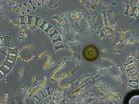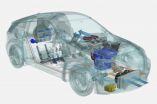(Press-News.org) PITTSBURGH, April, 13, 2015 - A serendipitous combination of technology and scientific discovery, coupled with a hunch, allowed University of Pittsburgh Cancer Institute (UPCI) researchers to reveal a previously invisible biological process that may be implicated in the rapid growth of some cancers.
The project, funded by the National Institutes of Health (NIH), is described in today's issue of the Proceedings of the National Academy of Sciences (PNAS).
"I was so amazed by what I was seeing," said lead author Masahiro Shuda, Ph.D., research assistant professor in Pitt's Department of Microbiology & Molecular Genetics. "We repeated and repeated our work to prove that the standard scientific dogma wasn't the complete story."
Dr. Shuda and his colleagues showed that a well-known cancer protein called mTOR, previously thought to be solely responsible for controlling a form of protein production important in cancer cells, called cap-dependent translation, can actually hand its work off to a different protein, CDK1, when cells are dividing. They observed the process while examining a viral oncoprotein that allows a common and usually harmless virus to transform healthy cells into cancer cells.
Merkel cell polyomavirus (MCV) was discovered in 2008 by co-authors Yuan Chang, M.D., and Patrick S. Moore, M.D., M.P.H., in the Cancer Virology Program at UPCI, partner with UPMC CancerCenter. It causes a rare but deadly skin cancer called Merkel cell carcinoma. They later found a viral protein called "small tumor protein," or sT. It may start a chain reaction that enables tumor growth resistant to cancer drugs that inhibit the protein mTOR.
In studies dating back to the 1960s, scientists had assumed that cap-dependent protein synthesis was turned off during cell division. The new study reveals that this is not necessarily so and that CDK1 can substitute for mTOR. Both mTOR and CDK1 work by inhibiting a gatekeeper protein, called 4E-BP1, that shuts off cap-dependent protein synthesis.
Less than 1 percent of cells are in the active division cycle called mitosis, even in very aggressive cancers, which makes studying cells in mitosis difficult. In addition, a drug traditionally used to arrest the cells during division inhibits protein production by CDK1. This is likely why previous research did not identify the important role that CDK1 appears to play.
Dr. Shuda used a technology called flow cytometry to identify cells undergoing division. With special fluorescent tags, he was able to see mitotic cells produce fully inactivated 4E-BP1 by CDK1. He also directly measured proteins being made during mitosis.
Sure enough, even when mTOR was knocked out, CDK1 was still present and able to allow protein synthesis needed for cell division to progress.
"Now, we still can't say that this process involving CDK1 contributes to cancer - that's something we'll tackle with future research," said Dr. Moore, senior author and professor of molecular genetics and biochemistry at Pitt. "But it does point toward a fundamental control mechanism in cell biology and leads to the interesting possibility that creating or combining cancer drugs, so that they inhibit both mTOR- and CDK1-related protein synthesis, could be a very useful therapy to pursue."
INFORMATION:
Additional researchers on this work are Celestino Velásquez, B.S., Erdong Cheng, Ph.D., Daniel G. Cordek, Ph.D., and Hyun Jin Kwun, Ph.D., all of Pitt. Drs. Moore and Chang jointly run their laboratory at UPCI.
This research was supported by NIH National Cancer Institute grants R01CA136806, CA136363 and CA170354. The flow cytometry was performed using a facility supported in part by NIH grant P30CA47904.
About UPCI
As the only NCI-designated comprehensive cancer center in western Pennsylvania, UPCI is a recognized leader in providing innovative cancer prevention, detection, diagnosis, and treatment; bio-medical research; compassionate patient care and support; and community-based outreach services. Investigators at UPCI, a partner with UPMC CancerCenter, are world-renowned for their work in clinical and basic cancer research.
http://www.upmc.com/media
Contact: Allison Hydzik
Phone: 412-647-9975
E-mail: HydzikAM@upmc.edu
Contact: Courtney McCrimmon
Phone: 412-586-9773
E-mail: McCrimmonCP@upmc.edu
HOUSTON - (April 13, 2015) - For decades, scientists and physicians have puzzled over the fact that infants with the postnatal neurodevelopmental disorder Rett syndrome show symptoms of the disorder from one to two years after birth.
In a report in the Proceedings of the National Academy of Sciences, Dr. Huda Zoghbi and her colleagues from Baylor College of Medicine and the Jan and Dan Duncan Neurological Research Institute at Texas Children's Hospital, unravel the mystery by looking at when and how the causal gene involved (methyl-CpG binding protein 2 or MECP2) binds ...
Fresh insights into how bacteria protect themselves - by forming a waterproof raincoat - could help develop improved products to protect plants from disease.
Researchers have discovered how communities of beneficial bacteria form a waterproof coating on the roots of plants, to protect them from microbes that could potentially cause plant disease.
Their insights could lead to ways to control this shield and improve its efficiency, which could help curb the risk of unwanted infections in agricultural or garden plants, the team says.
Scientists at the Universities of ...
A new analysis of the chemical make-up of meteorites has helped scientists work out when the Earth formed its layers.
The research by an international team of scientists confirmed the Earth's first crust had formed around 4.5 billion years ago.
The team measured the amount of the rare elements hafnium and lutetium in the mineral zircon in a meteorite that originated early in the solar system.
"Meteorites that contain zircons are rare. We had been looking for an old meteorite with large zircons, about 50 microns long, that contained enough hafnium for precise analysis," ...
Diversity of life abounds on Earth, and there's no need to look any farther than the ocean's surface for proof. There are over 200,000 species of phytoplankton alone, and all of those species of microscopic marine plants that form the base of the marine food web need the same basic resources to grow--light and nutrients.
A study by a team of scientists from the Woods Hole Oceanographic Institution (WHOI), University of Rhode Island (URI), and Columbia University, published April 13 in the Proceedings of the National Academy of Sciences reveals how species of diatoms--one ...
ANN ARBOR, Mich. - One of the brain's main jobs is information processing - what is critical, however, is that information in the brain gets transferred to the right places at the right times.
Research on large-scale brain networks by the University of Michigan Medical School reveals that "hubs" in the brain - highly connected regions that like hubs of the airport system - tend to consistently attract information flow.
"Understanding how information transfer occurs in the brain is critical, especially if network hubs are taken off line by anesthesia, tumor or stroke," ...
This news release is available in German.
How can a pleasant vehicle climate be achieved efficiently? Researchers at the Technische Universität München (TUM) pursued this question in the context of the research project Visio.M funded by the German Federal Ministry for Education and Research (BMBF) with a total of 7.1 million euro. The results of their research show that the potential of energy efficient air conditioning is all but exhausted. And this applies also to gasoline powered cars.
Inefficiency has its advantages, too: In the past, waste heat ...
Researchers are beginning to explore whether the genetics of patients who experience a placebo effect are different from those of patients who don't. It's well known that people can feel better if they believe they are receiving treatment, but the biological pathways involved are relatively unexplored. In a new review, publishing April 13 in Trends in Molecular Medicine, scientists at Beth Israel Deaconess Medical Center discuss what we know as well as possible ethical issues related to conducting genetic tests to determine whether a patient is a placebo responder.
"Understanding ...
A new strategy to rule-out and rule-in heart attacks in emergency departments will help physicians treat patients faster, found a clinical trial published in CMAJ (Canadian Medical Association Journal).
Acute myocardial infarction (MI) is a common cause of death and disability around the world. Early diagnosis is critical for treatment and survival.
Swiss and Spanish researchers conducted a clinical trial to determine whether a new technique, previously tested in a small pilot study, would be effective in determining whether a patient has had a heart attack. They enrolled ...
Family physicians have an important role in advising women about the benefits and risks of egg freezing, argues an analysis in CMAJ (Canadian Medical Association Journal).
"With growing public awareness of social egg freezing, Canadian women may increasingly approach physicians in search of information and advice about the procedure," writes Dr. Angel Petropanagos, Faculty of Medicine, Dalhousie University, Halifax, Nova Scotia, with coauthors Alana Cattapan, Françoise Baylis and Arthur Leader. "Family physicians are uniquely positioned at the front lines of medical ...
Melanoma cells become drug resistant by using surrounding healthy cells to provide a 'safe haven' from treatment, according to new research* published in Cancer Cell today (Monday).
Around half of melanomas are caused by a mutation in a gene called BRAF. Drugs called BRAF inhibitors treat these melanomas by targeting the faulty gene. But these cancers can quickly develop resistance to these targeted treatments.
Scientists at the Francis Crick Institute, funded by Cancer Research UK, and at the Cancer Research UK Manchester Institute have discovered that a side effect ...

